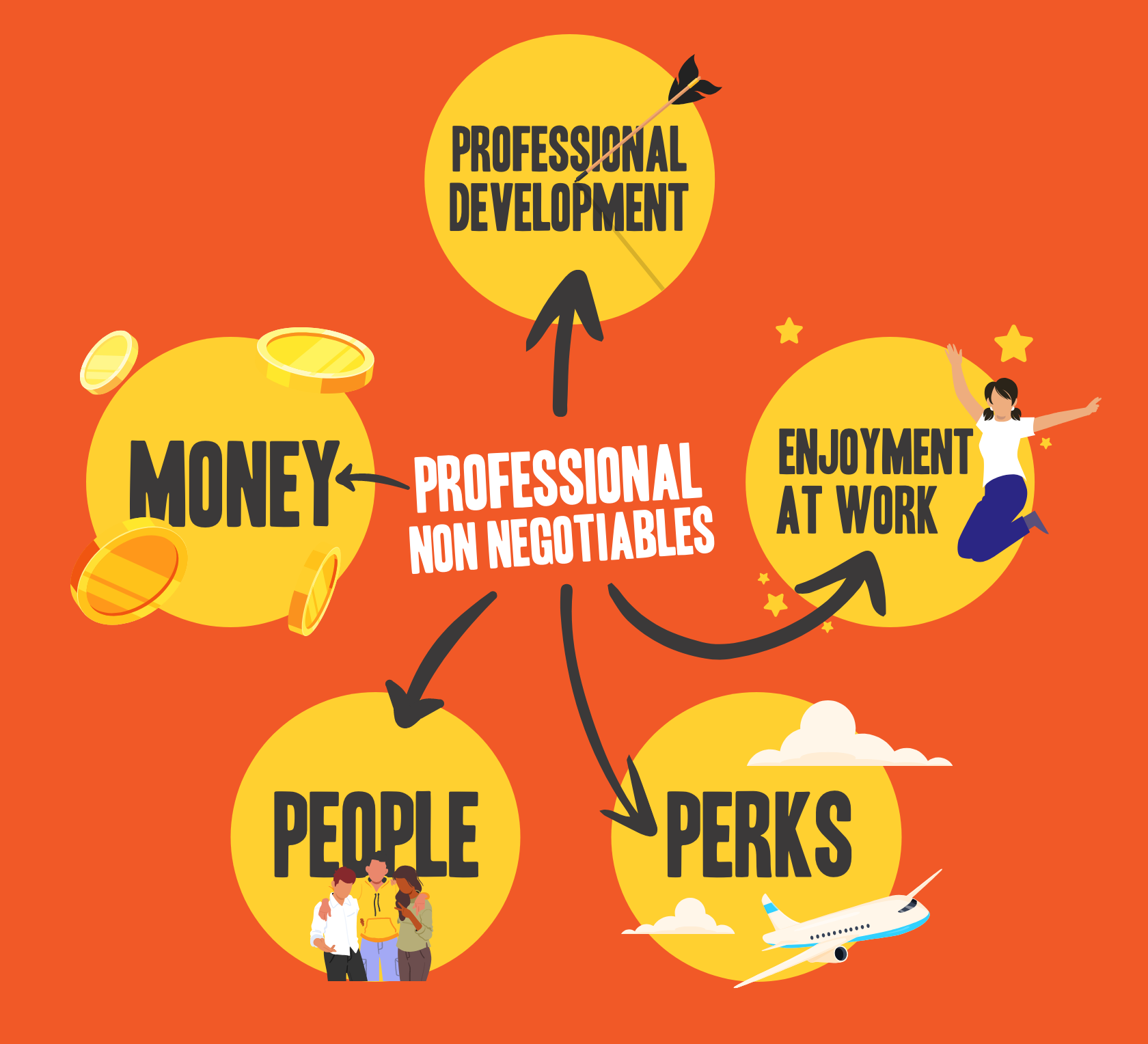In a perfect world, we want a job that ticks all the boxes: rewarding remuneration, supportive people, flexible work conditions, opportunities for professional development and juicy benefits.

But more often than not, only two or three of these options are on the table. So how do we really know what criteria to value over the next? You need to determine the fundamental aspects of a job that you are not willing to compromise on, which are your non-negotiables.
You’re probably familiar with the concept of non-negotiables in reference to your personal values. It’s a hard line that you’re not willing to cross under any circumstance. Think of it like making a decision to buy a house, or rent a room in a share house. What do you value over the next? A north-facing balcony? Location? Access to public transport? Amenities? More often than not, you’ll have one or two non-negotiables that you’re not willing to budge on.
Whether you’re searching for a new role or happy in your current role, it’s important to know your professional non-negotiables as they will help guide you to ensure that your current or next role aligns with your needs so that you get at the very least, what you’re after.
Let’s explore them briefly.

Money. Money. Money
Let’s be clear: chasing top dollar often comes with trade-offs like longer hours, increased stress and less time for personal pursuits. Determing whether a good pay package is a non-negotiable relies on your long-term financial goals, career stage, and personal circumstances. It’s often a key consideration upfront for people.
If your non-negotiables are professional growth or a strong work-life balance, be prepared to accept a modest pay package as these priorities typically come at the cost of a lower salary.

Professional Development
If you’re unsure whether professional development should be a non-negotiable of yours, ask yourself these questions: is the workplace reputable? Does it attract top talent? Are you looking to be mentored, learn new skills and blossom professionally?
If the answer to those questions is ‘yes’, you want to work in a role where you can supercharge your skills in a field and grow professionally and should consider it as a non-negotiable.
But remember this: a strong emphasis on career growth can sometimes mean accepting a lower starting salary or enduring a substandard work and people environment in the short term.

People
Are you tethered to your screen for most of the day? Or do you work in the ‘engine room’ of the business and contribute to growth? The nature of your work, be it remote or in the thick of things, significantly impacts how much the people around you will influence your job satisfaction and emotional well-being day to day.
This one speaks for itself. But if you work with people, having great colleagues is important otherwise coming to work day-to-day will be a drone. But if you don’t interact or rely on many people day to day, the people around you may not be an important non-negotiable.

Enjoyment at work
If your true passions exist outside your 9-5 and working in a purpose-driven role isn’t on the top of your list, enjoying what you do may not be a non-negotiable—and that’s okay!
But if making a difference matters to you, working in a role that makes an impact on other people will be important to you. The trade-off here is about seeking a balance between doing what you love and achieving other career and financial goals. Determining when enjoyment and impact are non-negotiables is about understanding what drives your satisfaction and how much you’re willing to sacrifice to achieve it.

Extras & Perks
Apart from your salary, perks like health insurance, job security, retirement plans, parental leave, and wellness programs can be deal breakers if you have dependants who rely on you. In recent years, the shift toward hybrid work has surged work-life balance to the forefront of people’s priorities.
For those with families, having a job that allows you to spend more time at home is appealing. These people might not be in the early stage of their careers and don’t need to be in the office day-to-day. With that in mind, jobs offering a work life balance might not always match those with a fast career progression.
The opportunity cost here involves evaluating how much you value your personal time and well-being against other benefits a job might offer. Understanding the role work-life balance plays in your life helps in identifying when this aspect becomes a non-negotiable in your career choices.
Identifying your non-negotiables is the cornerstone of making informed and fulfilling career choices, serving as a personal blueprint for navigating the complexities of the job market with confidence and clarity.

